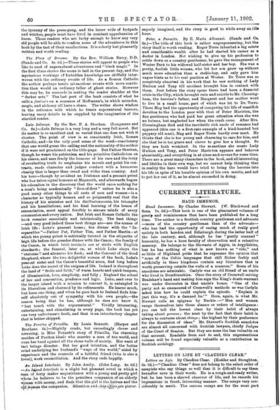its matter is so excellent and so varied that one
does not wish it shorter. The point of view is so consistently Irish, Roman Catholic, and—in the only good sense of the word—reactionary that one would guess the calling and the nationality of the author if it were not proclaimed on the title-page. But Father Sheehan, though he wears his patriotism and his primitive Catholicism on his sleeve, and uses freely the humour of his race and the irony of everlasting truth to emphasise his morals and point his con- trasts, reads character and judges conduct with a humorous
charity that is larger than creed and wider than country. And his hero—though by accident an Irishman and a peasant priest who has taken signal honours at Maynooth, and afterwards begun his education in the discovery that the world cares nothing for a man's being academically " first-of-first " unless he is also a good many other things to all sorts of men and women—is a character so typically human and so poignantly real that the history of his mistakes and his disillusionments, his triumphs and his humiliations, and his final learning of the lesson of renunciation, must appeal forcibly to sincere minds of every communion and every nation. But Irish and Roman Catholic the book remains essentially and intrinsically. The best things —and very good indeed these best things are—are the scenes of Irish life : Luke's peasant home ; the dinner with the " In- separables "—Father Pat, Father Tim, and Father Martin—at which the young priest is satirically tutored in the etiquette of high life before the grander dinner with the Canon ; the family of the Canon, in which Irish instincts are at strife with English standards; the funeral, later on, at which Luke obeys the " statutes " and alienates his flock ; and the Convent of the Good Shepherd, where the two delightful women of the book, Luka's peasant sister and the Canon's beautiful niece, find long before Luke does the secret of the enigma of life. Ireland is throughout the land of " frolic and faith," of warm hearts and quick tempers, of illumination, love, simplicity, and folly ; England the school of law and convention, prudence and logic. Luke, sent over to the larger island with a mission to convert it, is entangled in its liberalism and charmed by its refinements. He learns much, but loses one thing, and when he goes back to Ireland finds him- self absolutely out of sympathy with his own people,—the reason being that he has, although he does not know it,
" lost touch with the supernatural." Vividly interesting, entertaining, and stimulating in every page, the book has yet one very unfortunate fault, and that is an introductory chapter that is better skipped.






































 Previous page
Previous page